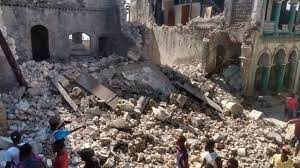This should have been a promising year for Africa. Instead, a lack of access to vaccines threatens to make things worse.
After decades of progress in the continent’s fight against poverty, Covid-19 plunged 30 million Africans into “extreme poverty” last year—meaning they live on less than $1.90 a day. As many as 39 million more could follow in 2021, according to the African Development Bank. In the sub-Saharan region, per capita income in absolute terms fell to levels last seen almost a decade ago.
The rate of inoculations in African countries has fallen behind other parts of the world. As of May 12, only 22.4 million shots have been administered on a continent with 1.3 billion people, according to the African Centres for Disease Control and Prevention. In the one exception—the Seychelles, an island nation that’s vaccinated most of its tiny population—a surge in infections led to a strict lockdown in May and questions about the efficacy of its Sinopharm and Covishield vaccines.
Bloomberg Markets
Featured in the June/July issue of Bloomberg MarketsIllustrator:
Rachell Sumpter for Bloomberg Markets
Most of the continent is depending on Covax, a global initiative created to provide equitable access to vaccines. But African countries won’t receive the bulk of those orders until the second half of the year, and those will cover only a fifth of their populations. Efforts to mass-produce shots on the continent have been delayed by countries, including the U.S., Canada, and the U.K., that were reluctant to temporarily lift World Trade Organization rules protecting intellectual property.
South Africa, one of the few nations able to buy its own vaccines, expects to receive almost 4.5 million doses by the end of June—for a population of about 60 million. Poorer countries such as Zimbabwe are relying on donations from China, Russia, and even India—where a devastating disease outbreak and temporary ban on exports have already curbed shipments to Africa.
That leaves Africa vulnerable to new waves of infections and extended lockdowns just as a long-envisioned free-trade area comes into effect this year. It’s the first step on the road toward establishing a continentwide customs union that aims to ease commerce across the continent. Africa’s densely populated cities are at risk of a crisis similar to the one that ravaged India in April and May.
That leaves Africa vulnerable to new waves of infections and extended lockdowns just as a long-envisioned free-trade area comes into effect this year. It’s the first step on the road toward establishing a continentwide customs union that aims to ease commerce across the continent. Africa’s densely populated cities are at risk of a crisis similar to the one that ravaged India in April and May.
“Debt risks and diminishing fiscal space push governments into a tight corner where they have to start thinking about fiscal consolidation before the recovery has gathered pace,” says Boingotlo Gasealahwe, an Africa economist with Bloomberg Economics.
In November, Zambia became the first African country to default on its debt during the pandemic. It failed to pay a coupon on one of its $3 billion of Eurobonds after the so-called Zambia External Bondholder Committee, which holds about 40% of the nation’s debt, rejected a request to suspend interest payments for six months. Bondholder committee advisers declined to say who belongs to the group.
Angola, Ethiopia, Ghana, Kenya, Namibia, Nigeria, and Zambia are among the nations that urgently need to reduce budget deficits and restore debt to a more sustainable path, says Jibran Qureishi, head of Africa research at Standard Bank Group Ltd., the continent’s biggest bank. He adds that emergency funding available this year may buy them some time. Calls to shrink fiscal gaps and slow debt growth won’t become urgent until next year, he says, when more Africans are vaccinated and the risk of lockdowns and restrictions is reduced.
But the tragedy of the pandemic may extend far into the future. It could delay efforts to combat climate change, which kills at least 1,000 people a year in the sub-Saharan region and leaves an additional 13 million homeless or lacking adequate food or water, according to the IMF. Cyclones, flooding, droughts, and other effects of a changing climate cost Africa $7 billion to $15 billion a year. By 2040 that’s likely to increase to as much as $50 billion, or 3% of continentwide annual gross domestic product, without investment in adaptation strategies such as early warning systems, according to the Global Center on Adaptation.







